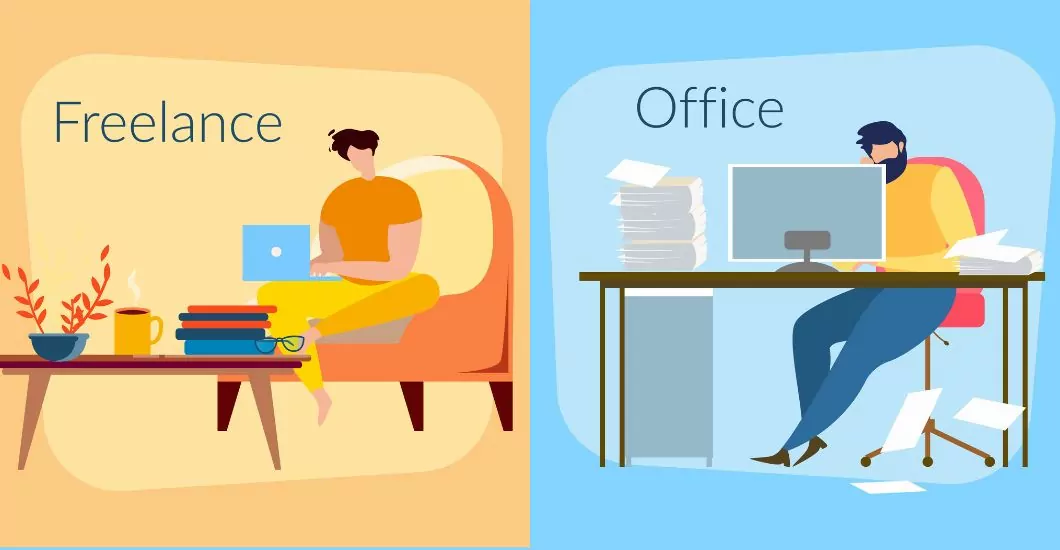Is freelancing a safe way to make a living?
As workers, we have to deal with the fact that our cash flow isn’t always steady. There are good and bad times to work as a freelancer, and our pay reflects that. Most people don’t like how unpredictable it is, so they don’t even want to think about working. Since your rent, student loan, and car bills are the same every month, no matter how much you make, shouldn’t your income be the same every month? at first glance, this may seem like the opposite of “steady work.” But working for yourself can give you more job protection than working for one company.
Losing a Customer vs. Getting Fired
When you are employed by a firm, it is reasonable to assume that the company is the sole source of your source of income. If you were to lose your job tomorrow, you would be out of work completely (or at least for a large amount of the time). If you are a freelancer and you work consistently for 20 customers, and each of those clients contributes 5% of your gross income, then if you lose a client (the equivalent of getting fired by an employer), you will only lose a portion of your income. This is because each client contributes 5% of your gross income. This circumstance is noticeably simpler to tolerate and adjust to in comparison to the earlier one.
But Aren’t Freelancers Risk Takers?
Freelancers are generally willing to take more risks than non-freelancers, as evidenced by their career choice. I know that risk excites and motivates me because I’m generally an optimist, as are most people when evaluating risk (called the optimism bias). Making a “safe” decision like diversifying income may seem to contradict the freelancer mindset, but even freelancers need to control risk because although we may be optimistic, it’s inevitable that something bad and unexpected will happen. (Reality checks suck.) There are certainly many risks to freelancing – especially when starting out – but freelancers need to limit risk regardless to create financial security for the future and reduce stress and anxiety in the present.
The Freelancer Lifestyle: Why I Love Being Self-Employed
It’s not just about the money, or even the possibility of making money, when you work for yourself as a freelancer. However, financial considerations are not nearly as important as they seem to be. It’s not only about the job itself; it’s also about the great and liberated lifestyle that comes along with it.
1. Where I want to Work
I usually work at home or at school, but while I was learning abroad, I worked in Barcelona, Berlin, and Copenhagen. It is crazy. I can be on a beautiful beach somewhere and still be productive and make money as long as I have a MacBook Pro and a fairly fast internet connection. For example, I can give IT advice to clients over the phone from anywhere by using remote access/management software to see and control their computer screens. I can also create and develop websites from anywhere with an internet connection.
2. I Can Work With Anyone I Want:
If you’ve ever had a job, you’ve probably had to work with someone you didn’t like at some point. You might even dislike him or her. Working with someone like that can be very annoying, can add stress to your life that you don’t need, and can sometimes drive you crazy. If I have a client I don’t like very much, I can “fire” the client. Yes, I might lose a small amount of money because of this (if I don’t find other ways to make money), but I gain something much more valuable: my sanity.
3. No Limit:
As a worker, I can make as much money as I want and do as much work as I want. My income is not limited by my employer’s budget or my ability to ask for a rise. In theory, as long as I have enough time, I can work for as many people as I want. I can always hire someone else if I don’t. There are many things that will limit you if you have a “regular” job, such as your boss, your job title or description, your strict schedule, your responsibilities, etc. Since I work on my own, no one but me limits what I can do. This really gets me going because I know that getting comfortable leads to failure, so I’m always coming up with new ways to help my clients, be more productive, and make more money.
4. Be Your Own Boss:
This goes in with the point I made before: you may have had supervisors in the past that you didn’t get along with, but there’s nothing you can do about that unless you want to risk losing your job. Being my own boss is not only relaxing but also gives me the freedom to steer my company in whatever direction I choose at any time and from any location, which leads me to my final argument… Being my own boss is incredibly liberating. Not only does it lower my stress levels, but it also gives me complete control over how my company is operated.
5. Work If You Desire:
I like that my schedule may be adjusted as needed. As long as I make the necessary preparations, I am free to take a trip (nearly) whenever I like. If I don’t have anything scheduled for the morning, I have the flexibility to sleep in or not start work until noon on any given day, in addition to having the freedom to take vacations whenever I want. Alternately, if I have some appointments but just don’t feel like working today, I am free to cancel or reschedule those sessions without incurring any additional fees. Although there are certain client requirements, such as deadlines, that I must stick to and make every effort to fulfill, the total amount of time that I spend working on any given day is nearly entirely up to me.
6. Do What I Like:
That is the most enjoyable aspect; it is what prevents me from working as a freelancer and motivates me to get out of bed and start the day with enthusiasm. I am no longer forced to engage in activities that I detest in favour of those that I enjoy. I have the option of referring a client to another freelancer or company and earning a commission in the process, or I can outsource/outsource specific work if a client wants me to perform something that I do not want to undertake. Working with engaging customers who provide constructive feedback while also allowing me to use my creative side is the highlight of my profession





Comments
I do believe that freelancing is the modern way of getting quick employment